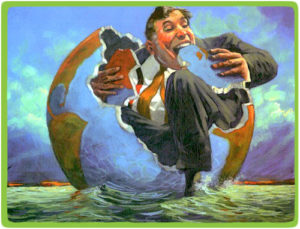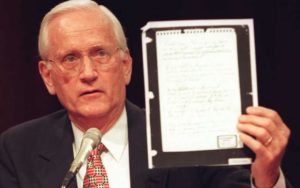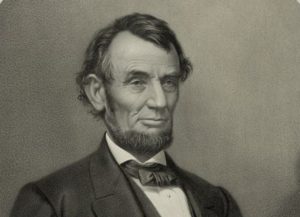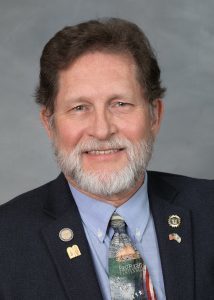Solo había dos países pertenecientes a Naciones Unidas que no apoyasen el pacto contra el calentamiento del planeta: Siria y Nicaragua. Ahora ya son tres.

Corporates eating the world. Imagen: http://socialistnetwork.org/wp-content/uploads/2014/09/corporates-eating-the-world.jpg
Las consecuencias de que el presidente Donald Trump retire a Estados Unidos del Acuerdo de París contra el cambio climático son muchas y complejas, la mayoría negativas. No obstante, al margen de especulaciones, hay algunas cuestiones claras:
1. EEUU se retira de un pacto mundial que apoya hasta Corea del Norte
Lo primero es que EEUU deja un pacto que es apoyado por otras 193 naciones del planeta ( aquí está la lista), prácticamente todos los países de la Tierra. Solo hay dos pertenecientes a Naciones Unidas que no están: Siria y Nicaragua. Pero todos los demás lo firmaron, incluso la Corea del Norte de Kim Jong Un.
Tras aprobarse un acuerdo internacional de este tipo, luego hay que esperar un tiempo hasta que se suman las ratificaciones de países suficientes para que entre en vigor. El pacto de París es el acuerdo internacional que más rápido ha conseguido su ratificación en la historia de Naciones Unidas.
La salida de EEUU no va a gustar al resto del planeta y va a provocar reacciones. La expresidenta irlandesa Mary Robinson ya había adelantado que, si Estados Unidos decidía retirarse de los compromisos asumidos en el Acuerdo de París contra el cambio climático, se convertiría en “un estado paria”.
2. El segundo emisor de CO2 deja a los otros el problema de cambio climático
El Acuerdo de París supuso un hito justamente por unir a tantos países de la Tierra contra el cambio climático, aunque no todos tienen la misma responsabilidad en este problema. Dentro del pacto están los países más industrializados que históricamente son los más culpables de que el planeta se esté calentando a causa de los gases de efecto invernadero lanzados a la atmósfera desde la Revolución Industrial por la quema de carbón o petróleo(como la UE, EEUU, Japón, Canadá, Rusia…). También incluye a las naciones emergentes que sin haberlo causado sí que resultan ahora decisivas para resolver el problema (como China, India, Brasil…). Y cuenta además con el apoyo de las naciones petroleras (Arabia Saudita, Qatar…) o el conjunto de los países en desarrollo.
La salida de EEUU supone que el que es hoy el segundo mayor emisor de gases de CO2 en el mundo (el primero es China) y el mayor emisor histórico desde la Revolución Industrial deja a todos los demás que resuelvan el problema. Por un lado, esto hace mucho más difícil el esfuerzo colectivo para que el aumento de la temperatura media del planeta no suba más de 2 °C (3.7°F).
Pero además provoca una muy injusta paradoja: que otros países mucho más pobres y sin ninguna culpa (incluso naciones africanas como República Democrática del Congo, Burundi, Liberia…) contribuyan al esfuerzo internacional contra el cambio climático, mientras el principal responsable mira hacia otro lado.
3. Pone en peligro la mayor oportunidad para luchar contra el cambio climático
Antes del Acuerdo de París, Naciones Unidas ya consiguió que se aprobase un tratado contra el cambio climático: el llamado Protocolo de Kioto (que obligaba a reducir emisiones solo a los países más ricos). Sin embargo, se quedó prácticamente en nada. En aquella ocasión el motivo fue… EEUU. Después de años de negociaciones, en 2001 el presidente George W. Bush decidió no ratificar el tratado.
Tras este revés, tuvieron que pasar 14 años hasta que se consiguió cerrar de nuevo un acuerdo, el de París, que por primera vez involucraba a todos los países en la lucha contra el cambio climático.
No cabe duda que la retirada de EEUU pone en peligro la mejor oportunidad que se tiene ahora mismo para luchar de forma colectiva contra el cambio climático antes de que sea ya demasiado tarde. Algunos países que se sumaron al pacto en 2015 por la presión de quedarse aislados podrían aprovechar ahora para seguir la senda de EEUU, lo que haría saltar por los aires el acuerdo. Aunque también puede pasar todo lo contrario: que todas las naciones consoliden más su unión como respuesta a EEUU. Ninguno de los dos escenarios parecen positivos para el país que preside Trump.
De momento, China y la UE ya han asegurado que continuarán con el Acuerdo de París aunque no esté EEUU.
4. Para EEUU no cambia tanto el dejarlo o no
Paradójicamente, no cambia tanto para EEUU abandonar o no el Acuerdo de París desde el punto de vista de sus acciones internas. Es de suponer que alguien se lo habrá explicado al presidente Trump, pero este pacto climático no fija obligaciones de reducción de gases para los países, sino que solo les compromete a cumplir sus propios planes nacionales ( aquí el texto del acuerdo). Se diseñó así para conseguir el apoyo de todos y para evitar el rechazo específico de EEUU.
Esto quiere decir que la política climática de EEUU no viene marcada por Naciones Unidas, sino por las normas que se pongan en marcha en el país. Hasta la llegada de Trump, estas políticas se basaban principalmente en el Plan de Energía Limpia de Obama. Pero este programa quedó bloqueado en la Corte Suprema y el nuevo presidente ya ha dado los primeros pasos para desmantelarlo.
Si el objetivo de EEUU con Obama era que EEUU redujera sus emisiones entre un 26% y un 28% para 2025 con respecto a los niveles de 2005, la consultora Rhodium Group estimó que si se cancelan las políticas energéticas del gobierno anterior entonces no se llegará a una disminución del 14%, aunque se hubiera seguido en el Acuerdo de París.
El pacto de Naciones Unidas tampoco incluye sanciones si no se cumplen los objetivos nacionales. Solo compromete a los países a presentar información transparente sobre sus emisiones para poder seguir sus progresos y, en caso de no alcanzar sus objetivos nacionales, prevé simplemente que entre en acción un comité de carácter facilitador.
Quizá Trump se planteó dejar el pacto de París para no tener que dar explicaciones sobre lo que emita o no EEUU. Pero es probable que su salida aumente todavía más la presión sobre lo que haga en materia climática. Si los otros países del mundo realizan esfuerzos para reducir sus emisiones, seguro que reclaman lo mismo a Trump, esté o no en el pacto.
5. Más tensiones entre los países y retrasos
¿La decisión de Trump hará que se dejen de realizar esfuerzos para reducir las emisiones o que salte por los aires el gran pacto internacional contra el cambio climático? Es muy difícil saber hasta qué punto puede perjudicar una decisión así la lucha contra el cambio climático. En gran medida dependerá de cómo reaccione el resto del mundo. Como hemos visto en el punto anterior, Trump puede desmantelar toda la política climática de EEUU esté dentro o no de París. Ahora bien, hay muchas empresas y estados en el país que van hace tiempo en una dirección muy distinta a la del presidente. Este miércoles, la ciudad de Nueva York mostró su compromiso con el pacto de París esté EEUU dentro o no.
No es muy creíble que Trump pueda acabar con la transformación del mundo hacia unas energías más limpias. Ahora bien, seguro que todo esto puede retrasarlo y también generar muchas tensiones entre los países.
En: univision






